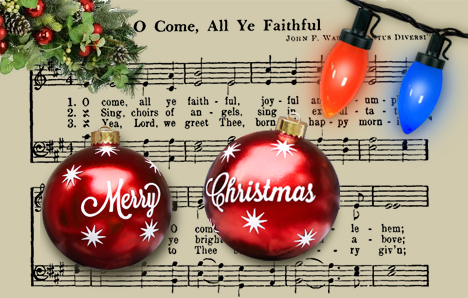 I love Christmas music. There is simply no other time of the year when
we listen to as much music about a season as we do at Christmastime. Whether it’s
Brenda Lee singing "Rockin’ Around the Christmas Tree” or Nat King Cole singing
about "chestnuts roasting on an open fire and Jack Frost nipping at your nose,”
just hearing these seasonal songs gets me in the right frame of mind for the
big day.
I love Christmas music. There is simply no other time of the year when
we listen to as much music about a season as we do at Christmastime. Whether it’s
Brenda Lee singing "Rockin’ Around the Christmas Tree” or Nat King Cole singing
about "chestnuts roasting on an open fire and Jack Frost nipping at your nose,”
just hearing these seasonal songs gets me in the right frame of mind for the
big day.
How many songs are there about Christmas? According to the Museum of the
Bible, there are 9,274 songs for the Yuletide event. Some of them are classic
best sellers, such as "White Christmas” by Bing Crosby. Some are simply
ridiculous, like the Barking Dogs rendition of "Jingle Bells.” Some songs are
much more sacred, like "O Come All Ye Faithful.” What are your favorite
Christmas carols? Mine is "Silent Night.” I simply cannot celebrate Christmas until
I sing along with that song.
Just what is the difference between a regular Christmas song and a
carol? Is one to be sung while you’re hanging out with your friends and another
to be sung in a church? As it turns out, there isn’t much difference between
what we might think are secular songs and sacred songs at Christmas.
The word carol is from the Old French language, and it means a joyous
dancing song. Carols were not necessarily sung during the Christmas season
originally, but as time went on, people began to write more music for the
happiest time of the year. Before there were radios and jukeboxes to play
recorded music, songs were sung by roving groups of people in homes, local
eating establishments and in the market square. These entertainers were known
as carolers. Originally, carols were not sung in churches. Most early singing
in churches was more of a chant in Latin and was typically from the Psalms.
Carols were considered street songs.
That began to change when, in 1223 A.D., St Francis of Assisi began
nativity plays to commemorate the birth of Christ. His characters sang their
scripted lines in the common language of the people. This caught on. People
began to sing along with these joyous Christmas songs. As time went on,
Christian writers borrowed popular tunes and put their lyrics to music. We
don’t always know the composers of these songs either. In many cases, that’s
because different writers wrote lines to the same song. However, as time went
by, some of these carols made their way into the church as songs to be sung
during the Advent season.
Not everyone liked Christmas carols. In the 17th century, British
politician and Puritan Oliver Cromwell had caroling outlawed in Britain. The
Puritans were not necessarily fond of Christmas either. They thought it was too
secularized. They did not allow it to be celebrated for a period of time,
although people still did at home and kept on singing. Eventually, the joy and
hope of Christmas was too much and the laws that banished Christmas and
caroling were merrily overturned.
I think the reason Christmas carols wouldn’t go away is because they
were the music of the people and they made people feel happy – not just happy
for a short time, but it gave them a real sense of hope, even in the midst of
dismal times. There is that quality that you find at Christmas that shines a
light on all of us and gives us a reason to rejoice. That’s what I find to be
true when I hear those familiar tunes.
So when you hear a Christmas song and begin to sing along, keep in mind
that you are sharing a cheerful moment with millions of people who have come
before you who kept on singing carols. I hope it gets you in the right frame of
mind and puts a bounce in your step. As Nat King Cole sings so well, "Although
it’s been said many times, many ways, Merry Christmas to you.”